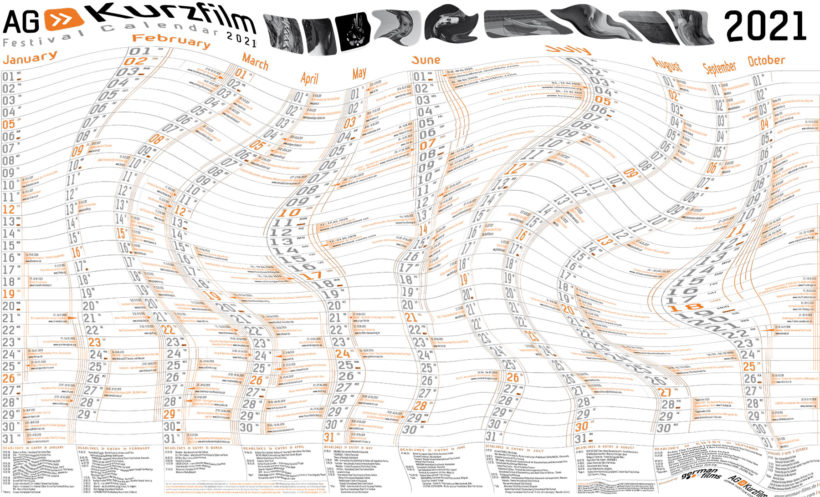
Fictional Festival Calendar 2021, © rww CC BY 2.0 (Template Festival Calendar of the AG Kurzfilm 2020)
At the beginning of the pandemic, when cinemas everywhere were completely closed, film festivals only had the choice between canceling or going online. Since the relaxations for cinemas, i.e. in Germany since June/July, the situation eased. Cinemas invested in hygiene measures to be able to reopen. Festivals gained hope, but are confronted with the problem that space capacities shrank at their traditional venues. Festivals responded quickly and flexibly by expanding first in space and then in time.
Spatial expansion
It’s actually quite logical: when it gets too crowded in one place, you have to expand. In larger cities, film festivals have sometimes sought out open-air sites for this purpose, sometimes larger cinemas. interfilm Berlin, for example, had this intention: “We have to let some of the smaller venues of the last few years take a break this year, but new ones are being added”[1].
Where that was not possible or not sufficient, festivals expanded geographically. One of the first film festivals to come up with this idea was probably the Sundance Festival. Initially, it was looking at expanding to all of Utah in 2021. Then, in June, new director Tabitha Jackson announced additional venues, “We are in exploratory discussions with cinemas from LA to Louisville, from New York to Nashville, from Austin to Atlanta, from Detroit to Denver, from Minneapolis to Mexico City-with many more to come.”[2].
Ars Electronica even “went on stage in 120 locations around the world and on the web.”[3]
Among the larger festivals in Germany, the Duisburg Film Week had a similar plan. In July, the festival announced that in order to continue showing films on the big screen, it intended to screen selections from the festival program in other cities. “Satellite programs” were to be shown in six selected cinemas in Germany, Austria and Switzerland in early November. As we know today, the second lockdown put a stop to this plan, with the exception of Zurich. Other festivals that wanted to expand were thwarted by their local funding agencies.
Assessment: moving to open-air locations and larger venues is a solution for festivals. However, suboptimal, as they lose their festival center. And smaller cinemas will be left in the lurch. Expanding beyond city, county or state borders can be disadvantageous in terms of funding policy. For presumably this same, good reason, Tabitha Jackson specifically emphasized the festival’s 40-year ties to its state.
Still to be seen is the impact on other festivals of larger festivals hosting satellite programs in cities that have their ‘own’ festivals.
Expansion in time
The next logical step is to expand the duration of the festival. Some festivals combined geographical expansion with temporal extension. Crossing Europe (Linz), for example, promised a “festival feeling in stages”: “Over four months, this cinematic voyage of discovery stretches across Europe.”[4]
The first short film festival to announce a temporal extension was the Aesthetica Short Film Competition. Originally announced for November 4-8 locally in York, Aesthetica expanded to almost a month! Namely, from November 3 to 30 – but almost exclusively online. The L’Alternativa Festival Barcelona (extended by seven days until 29.11.) and the hybrid planned IDFA Amsterdam (extended by seven days until 06.12.).
Also interfilm Berlin has extended its offer – different than planned, only online: the program can be seen from November 10 to December 13 on the streaming platform Sooner. And the Short Film Festival Oberhausen is planning an extension with online competitions on four days before the physical festival (May 5-10)[5].
Assessment: hard to say! It is too early for that. One could go philosophical. The linear, firmly timed and located concept of time is out of joint. Time becomes elastic, liquefies. This forces us to react just as elastically. Only film can capture time without stopping it, said Andrei Tarkovsky [6], but festivals can only show it.
Conclusion: One thing is already certain, and a glance at my mailbox tells me so: In the already festival-heavy month of November, so many online film offers [7] are competing for the, not inexhaustible, attention of potential viewers as never before. And, since it is certain that at some point there will be relaxations with new requirements, whose rules change ‘in the middle of the game’, it is also certain that postponements and extensions will be made.
[1] Press release “interfilm will take place!” of 22.09.20
[2] Open letter “Dear friends” (Update: Press release of 03.12.20)
[3] Press conference, 01.09.20
[4] Press release “Crossing Europe EXTRACTS”, 31.09.20
[5] Press release, 22.09.20
[6] Die versiegelte Zeit – Gedanken zur Kunst, zur Ästhetik und Poetik des Films (2012 in translation by Hans-Joachim Schlegel); planned new edition February 2021
[7] see also: “Too Much Content“
1 Trackback